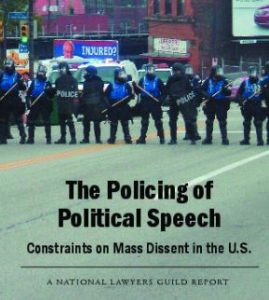The Oregon Standoff cases test the bounds of a number of issues from judicial transparency to Fourth Amendment protections, and lengthy pre-trial detentions.
 As previously mentioned, the Internet, including Twitter, has recently been abuzz with a story about Ryan Bundy. What really happened is anybody’s guess. According to the Bundy family and their supporters, as reported by Fox News, at a time when no court hearings were scheduled, Ryan was forcibly transported from the Multnomah County Jail, and taken somewhere. The concern was that he was being taken to a hospital to be subjected to forced surgery, against his will, to remove something from his arm or shoulder. That something was a bullet, bullet fragment, or shrapnel, depending on who you ask. Ryan received it as part of an injury he sustained at the stop when LaVoy Finicum was killed.
As previously mentioned, the Internet, including Twitter, has recently been abuzz with a story about Ryan Bundy. What really happened is anybody’s guess. According to the Bundy family and their supporters, as reported by Fox News, at a time when no court hearings were scheduled, Ryan was forcibly transported from the Multnomah County Jail, and taken somewhere. The concern was that he was being taken to a hospital to be subjected to forced surgery, against his will, to remove something from his arm or shoulder. That something was a bullet, bullet fragment, or shrapnel, depending on who you ask. Ryan received it as part of an injury he sustained at the stop when LaVoy Finicum was killed.
Other journalists less sympathetic to the Bundy case reported that the whole incident was exaggerated, dramatized, and they questioned both whether there was in fact any bullet or bullet fragment, as well as why Ryan wouldn’t want to have it removed to serve as evidence of some sort. One of the alleged points of contention surrounded the question of what would happen to such alleged evidence, and who it would belong to. According to Ryan’s reported reasoning, as long as the object remained in his body, he would maintain in physical possession and control of it, whereas if it was removed, who knows what might happen to it.
Multiple media sources have reported that regardless of the reason(s) for Ryan’s apparent temporary removal from the jail that day, when jail guards came to get him, some sort of scuffle ensued between Ryan and the guards, and as a result of that purported scuffle, upon his return, Ryan has subsequently been moved to “disciplinary” quarters, including solitary confinement.
Now, for purposes of this discussion, here’s the most important point: According to Aimee Green at the Oregonian, there were no court records explaining where or why Bundy was being taken. According to her, there was nothing on the court calendar, including some kind of hearing or court proceeding, that would explain what had happened. So regardless of the conflicting stories about what had happened, apparently there was no way to actually confirm or verify anything.
 This is a subject Cheri Roberts and I discussed on her Challenging the Rhetoric radio program last week. Cheri wanted to know what would be required, legally, to do what the Bundys were suggesting had happened, and why Ryan might be opposed to it – because, arguably, extraction of whatever was in his arm might provide definitive evidence regarding the ongoing investigation into the actions of FBI HRT members during the fatal stop that resulted in LaVoy Finicum’s death, which is a good point.
This is a subject Cheri Roberts and I discussed on her Challenging the Rhetoric radio program last week. Cheri wanted to know what would be required, legally, to do what the Bundys were suggesting had happened, and why Ryan might be opposed to it – because, arguably, extraction of whatever was in his arm might provide definitive evidence regarding the ongoing investigation into the actions of FBI HRT members during the fatal stop that resulted in LaVoy Finicum’s death, which is a good point.
As I explained to Cheri, however, regardless of the fact that Ryan is being held in pre-trial custody, the Fourth Amendment still provides protection against unreasonable searches and seizures. And any such purported surgery would be considered and treated as a search, and recovery of any object(s) would be considered and treated as a seizure of evidence. Under the constitution, in order to undertake anything of that nature, even with someone in custody, who has been deprived of their liberty, in the absence of valid, voluntary consent, there must be constitutionally adequate due process, including reasonable notice and a meaningful opportunity to be heard.
Any such procedure without consent, and against a person’s will would require a warrant or court order, signed by a judge, following procedures constituting due process. In other words, it’s not just something that jail guards, jail administrators, law enforcement, including the FBI, or the Justice Department can lawfully do without a court order. It has to be ordered by a judge. And any time such due process occurs in the court system, there is supposed to be a record of the proceeding. And that brings us back to the whole transparency issue that I have been talking about.
Ever since last week, no one really seems to know what actually happened. Upon Ryan’s return to the jail, apparently he was placed in “disciplinary quarters” and solitary confinement, so he hasn’t had much of a chance to communicate or talk to anyone, and court records don’t seem to shed light on any of this. And it’s not just Bundy-bashers who are interested in this sort of thing. Ryan has a family. He has a wife and children. They all want, and deserve, to know what is going on with him. But, for a variety of reasons, there appears to be a woeful lack of transparency.
On this point, one of the phrases we often hear – especially when it comes to judicial processes — is: “the record speaks for itself.” And that is supposed to mean something. There is supposed to be a record, and when there is, there is no need to speculate about it, because the record speaks for itself. In a truly transparent system, that would be the case. We could look at the record and know exactly what was going on. But, as this situation illustrates, apparently that is not always the case.
And speaking of the T-word, for the sake of transparency, Cheri Roberts wanted to know why Ryan might not want to have the object removed from his arm, to possibly help answer and resolve some lingering, unanswered questions. I told her I couldn’t speculate as to Ryan’s motives in that regard, but as I explained to her, transparency is something we expect and require of our governments. Individuals, on the other hand, have a right of privacy, and are not required to be transparent. As a general rule, in the absence of probable cause, due process, and other requirements, individuals are not required to waive their privacy; they are not required to have their persons, places and papers invaded, and cannot be forced to testify and provide evidence against themselves. The constitution protects individual privacy.
 And here’s a big point that many people seem to forget – especially in this case, that I later had the opportunity to discuss in more detail with Trent Loos on Rural Route Radio. Prior to trial, after a person has been accused and charged with a crime – even while that person is being held in pre-trial custody, they are entitled to a constitutional presumption of innocence. What this means, among other things, is that they are entitled to substantive and procedural due process; they are entitled to their full Fourth Amendment protections against unreasonable search and seizure, and; nothing that happens during the pre-trial phase or custody is supposed to be any form of “punishment.” Punishment is only supposed to be imposed once a person has been convicted – either by admission, or after being found guilty beyond a reasonable doubt. The only reasons a person is supposed to be held in custody pending trial, is based on legitimate concerns that they might attempt to abscond, and fail to appear for future court proceedings, including trial, or that they pose a genuine threat to themselves or public safety. In most cases, bail is sufficient to insure court appearances, and that is the method most often used as a substitute for pre-trial detention.
And here’s a big point that many people seem to forget – especially in this case, that I later had the opportunity to discuss in more detail with Trent Loos on Rural Route Radio. Prior to trial, after a person has been accused and charged with a crime – even while that person is being held in pre-trial custody, they are entitled to a constitutional presumption of innocence. What this means, among other things, is that they are entitled to substantive and procedural due process; they are entitled to their full Fourth Amendment protections against unreasonable search and seizure, and; nothing that happens during the pre-trial phase or custody is supposed to be any form of “punishment.” Punishment is only supposed to be imposed once a person has been convicted – either by admission, or after being found guilty beyond a reasonable doubt. The only reasons a person is supposed to be held in custody pending trial, is based on legitimate concerns that they might attempt to abscond, and fail to appear for future court proceedings, including trial, or that they pose a genuine threat to themselves or public safety. In most cases, bail is sufficient to insure court appearances, and that is the method most often used as a substitute for pre-trial detention.
And that certainly raises some interesting questions in this case, where so many of the defendants have now entered into plea deals after being held so long in pre-trial detention. The reality is, the conditions in pre-trial detention – especially for federal inmates – are usually much worse than post-trial incarceration. In my view, one of the government’s big strategies in this case has been the use of lengthy pre-trial detention – whether it is warranted and justifiable or not – as leverage to get some of the defendants to make plea deals.
I have been scratching my head about this particular issue for months. How can the government possibly justify such extensive pre-trial detention for so many of these defendants? That the government might charge some of them is one thing (I have said on multiple occasions, that I don’t think some of the defendants, including Wes Kjar, for example, should have ever been charged in the first place, and if the government wanted to get rid of those cases, the charges should have been dismissed outright), but to insist on holding so many of them in pre-trial detention for so long is another matter entirely. And I can’t see the legitimate justification.
 In my view, Dave Bundy, who is currently being held in Nevada, is a prime example of this. That Dave might be charged with something is one thing (it will be interesting to see what evidence is ultimately presented), but the only reason I can see that the government would insist on holding him in custody for months pending trial (it will be close to a year by the time the case finally goes to trial in early 2017) is purely for harassment, and presumed guilt by association, because his last name is Bundy.
In my view, Dave Bundy, who is currently being held in Nevada, is a prime example of this. That Dave might be charged with something is one thing (it will be interesting to see what evidence is ultimately presented), but the only reason I can see that the government would insist on holding him in custody for months pending trial (it will be close to a year by the time the case finally goes to trial in early 2017) is purely for harassment, and presumed guilt by association, because his last name is Bundy.
As part of the government’s one-size-fits-all approach in these cases, unreasonable pre-trial detention appears to be a big part of the government’s strategy in pressuring a whole bunch of the Defendants to enter plea deals, purportedly “admitting” that they engaged in a conspiracy to impede federal officers. On that score, to the extent many of these defendants were part of any alleged conspiratorial agreement, I seriously doubt that the affect such actions might have on federal employees even occurred to them, let alone served as any kind of motivating force. Under this theory, one might argue that the federal government shutdown in October 2013 was a conspiracy to impede federal officers, and that all congressmen who did not vote for the Continuing Appropriations Resolution, 2014, were part of the conspiracy. One of the big issues becomes the question of who, if anyone, might have actually intended to impede federal officers.
For many of these defendants, however, having been left with the impression that once the government had locked them in custody, it fully intended to throw away the key, the thought of better treatment in prison – in the post-trial, punitive phase of the process — rather than prolonged pre-trial detention was probably an incentive to do a plea deal – even if it meant admitting to things they never did, including, in Wes Kjar’s case, things they never even had an opportunity to do – just to reach a resolution and move on.
When it comes to plea deals in this case, there is anything but a level playing field. The government has all the leverage, and seems to be using it to full advantage.
Finally, and in all fairness to the bashers, there is no question, the actions of some of these defendants (including a wide variety of bizarre court filings) are not helping their cause in this regard. Many of them have now insisted on representing themselves, and have made a variety of statements and court filings that raise all kinds of questions, including challenges to the court’s authority, oath of office, etc. While I  seriously question the wisdom of much of what they have done in this regard, objectively, the bottom line is the vast majority of it amounts to nothing more than “political speech.” Among other things, they are exercising their right to freedom of expression and freedom of speech – which they still have a right to do, because they have not yet been convicted. But they are saying things the federal government does not want to hear, and it certainly appears that they are being punished for expressing such views, even at this stage of the proceedings. In fact, one could argue that most of the pre-trial detentions in these cases are nothing more than pre-trial punishment for political speech. To a large extent, what they are doing seems to be the functional equivalent of what other political dissidents have done, around the world, and ended up being jailed indefinitely in places like China or the USSR for criticizing their own governments. In this case, it appears that the biggest so-called crime, and the one for which they are being subjected to lengthy pre-trial detention, is political speech against the government. In that sense, their situation does bear similarities to political prisoners around the world. There are parallels between how they are being treated, and how so-called enemy combatants are treated by the U.S. Government, at places like Guantanamo Bay. And there seems to be little question that the government has chosen to use these defendants as examples, to show the rest of the country what can happen when you become too vocal, too critical of our government.
seriously question the wisdom of much of what they have done in this regard, objectively, the bottom line is the vast majority of it amounts to nothing more than “political speech.” Among other things, they are exercising their right to freedom of expression and freedom of speech – which they still have a right to do, because they have not yet been convicted. But they are saying things the federal government does not want to hear, and it certainly appears that they are being punished for expressing such views, even at this stage of the proceedings. In fact, one could argue that most of the pre-trial detentions in these cases are nothing more than pre-trial punishment for political speech. To a large extent, what they are doing seems to be the functional equivalent of what other political dissidents have done, around the world, and ended up being jailed indefinitely in places like China or the USSR for criticizing their own governments. In this case, it appears that the biggest so-called crime, and the one for which they are being subjected to lengthy pre-trial detention, is political speech against the government. In that sense, their situation does bear similarities to political prisoners around the world. There are parallels between how they are being treated, and how so-called enemy combatants are treated by the U.S. Government, at places like Guantanamo Bay. And there seems to be little question that the government has chosen to use these defendants as examples, to show the rest of the country what can happen when you become too vocal, too critical of our government.
Once again, if all this leaves you scratching your head, you’re not the only one.
Reposted from NEWSBUD / Boiling Frogs Post.
RANGE / RANGEFIRE! — Addressing Issues Facing the West / Spreading America’s Cowboy Spirit Beyond the Outback

